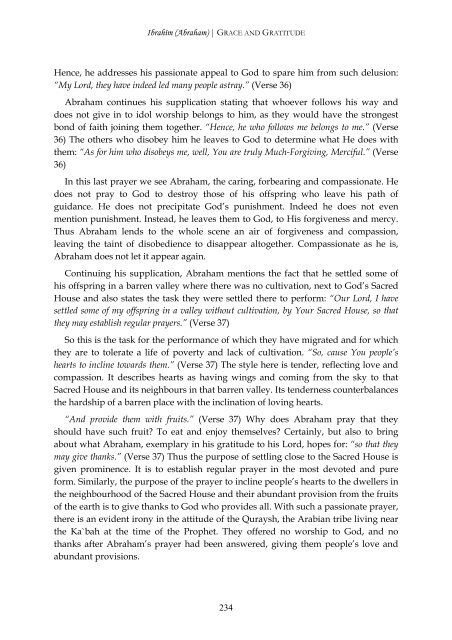Volume 10 Surah 12 - 15 - Enjoy Islam
Volume 10 Surah 12 - 15 - Enjoy Islam
Volume 10 Surah 12 - 15 - Enjoy Islam
Create successful ePaper yourself
Turn your PDF publications into a flip-book with our unique Google optimized e-Paper software.
Ibrahīm (Abraham) | GRACE AND GRATITUDE<br />
Hence, he addresses his passionate appeal to God to spare him from such delusion:<br />
“My Lord, they have indeed led many people astray.” (Verse 36)<br />
Abraham continues his supplication stating that whoever follows his way and<br />
does not give in to idol worship belongs to him, as they would have the strongest<br />
bond of faith joining them together. “Hence, he who follows me belongs to me.” (Verse<br />
36) The others who disobey him he leaves to God to determine what He does with<br />
them: “As for him who disobeys me, well, You are truly Much-Forgiving, Merciful.” (Verse<br />
36)<br />
In this last prayer we see Abraham, the caring, forbearing and compassionate. He<br />
does not pray to God to destroy those of his offspring who leave his path of<br />
guidance. He does not precipitate God’s punishment. Indeed he does not even<br />
mention punishment. Instead, he leaves them to God, to His forgiveness and mercy.<br />
Thus Abraham lends to the whole scene an air of forgiveness and compassion,<br />
leaving the taint of disobedience to disappear altogether. Compassionate as he is,<br />
Abraham does not let it appear again.<br />
Continuing his supplication, Abraham mentions the fact that he settled some of<br />
his offspring in a barren valley where there was no cultivation, next to God’s Sacred<br />
House and also states the task they were settled there to perform: “Our Lord, I have<br />
settled some of my offspring in a valley without cultivation, by Your Sacred House, so that<br />
they may establish regular prayers.” (Verse 37)<br />
So this is the task for the performance of which they have migrated and for which<br />
they are to tolerate a life of poverty and lack of cultivation. “So, cause You people’s<br />
hearts to incline towards them.” (Verse 37) The style here is tender, reflecting love and<br />
compassion. It describes hearts as having wings and coming from the sky to that<br />
Sacred House and its neighbours in that barren valley. Its tenderness counterbalances<br />
the hardship of a barren place with the inclination of loving hearts.<br />
“And provide them with fruits.” (Verse 37) Why does Abraham pray that they<br />
should have such fruit? To eat and enjoy themselves? Certainly, but also to bring<br />
about what Abraham, exemplary in his gratitude to his Lord, hopes for: “so that they<br />
may give thanks.” (Verse 37) Thus the purpose of settling close to the Sacred House is<br />
given prominence. It is to establish regular prayer in the most devoted and pure<br />
form. Similarly, the purpose of the prayer to incline people’s hearts to the dwellers in<br />
the neighbourhood of the Sacred House and their abundant provision from the fruits<br />
of the earth is to give thanks to God who provides all. With such a passionate prayer,<br />
there is an evident irony in the attitude of the Quraysh, the Arabian tribe living near<br />
the Ka`bah at the time of the Prophet. They offered no worship to God, and no<br />
thanks after Abraham’s prayer had been answered, giving them people’s love and<br />
abundant provisions.<br />
234

















